On this page

Forgiveness can be tricky, and it’s sometimes easier said than done. Everyone at one time or another has been asked for forgiveness and to be forgiven as well. But what are the odds we will be lucky enough actually to be forgiven? And what determines if we will forgive others?
We wanted to find out more about saying “I’m sorry,” so we polled 968 Americans to learn more about their perceptions and feelings on forgiveness and what it takes to both give and receive redemption. Continue reading to see how their responses stack up to your own feelings on forgiveness.
All Is Forgiven
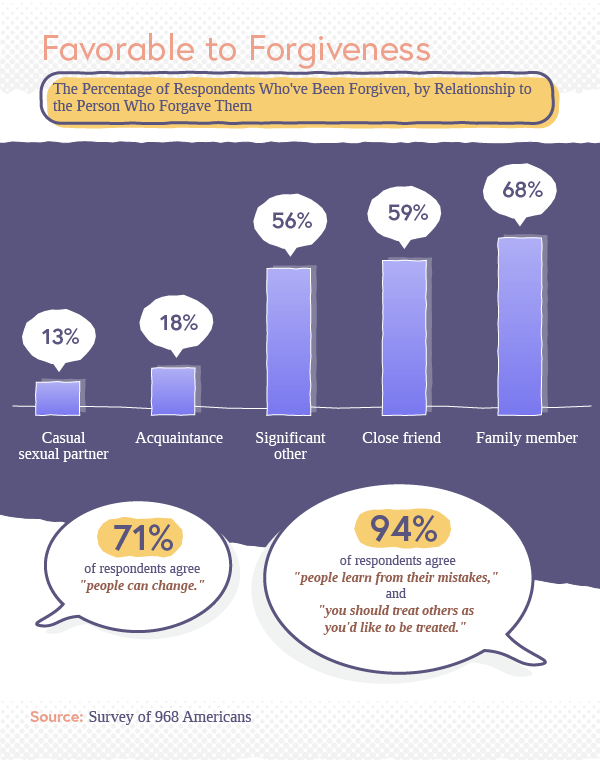
Forgiveness has many forms, and it’s most likely to come from someone close who knows you well and can see past your mistakes. For those surveyed, the most common source of forgiveness was from a family member: 68 percent. Forgiveness from a close friend came in at 59 percent, and forgiveness from a significant other ranked high at 56 percent. However, only 18 percent and 13 percent of people were forgiven by an acquaintance or casual sexual partner, respectively.
For some, forgiveness comes easily because of their personal beliefs. In fact, 71 percent of respondents said people could change, while 94 percent said people learned from their mistakes and should treat others as they’d like to be treated.
Regional Reprieve
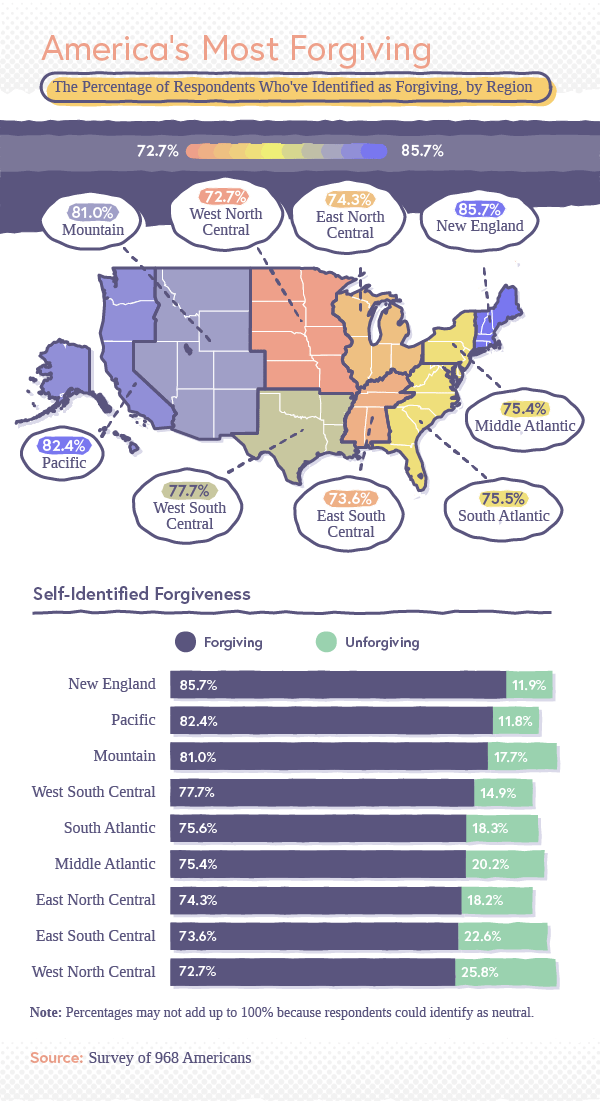
When looking at the data by region, we can see that some U.S. regions tend to be more forgiving than others. Nearly 86 percent of respondents from New England (including Connecticut, Maine, Massachusetts, New Hampshire, Rhode Island, and Vermont) identified as being forgiving. The least forgiving region, though? West North Central respondents from Iowa, Kansas, Minnesota, Missouri, Nebraska, North Dakota, and South Dakota claimed to roll the dice on forgiveness less often than all other regions, with nearly 26 percent of those surveyed identified themselves as unforgiving in nature.
How can forgiveness vary so vastly between regions? These areas often distinguish themselves with more than just geography. In fact, regions can often vary in cultural traditions, values, and political views, which can affect feelings of forgiveness as well.
Categorical Clemency
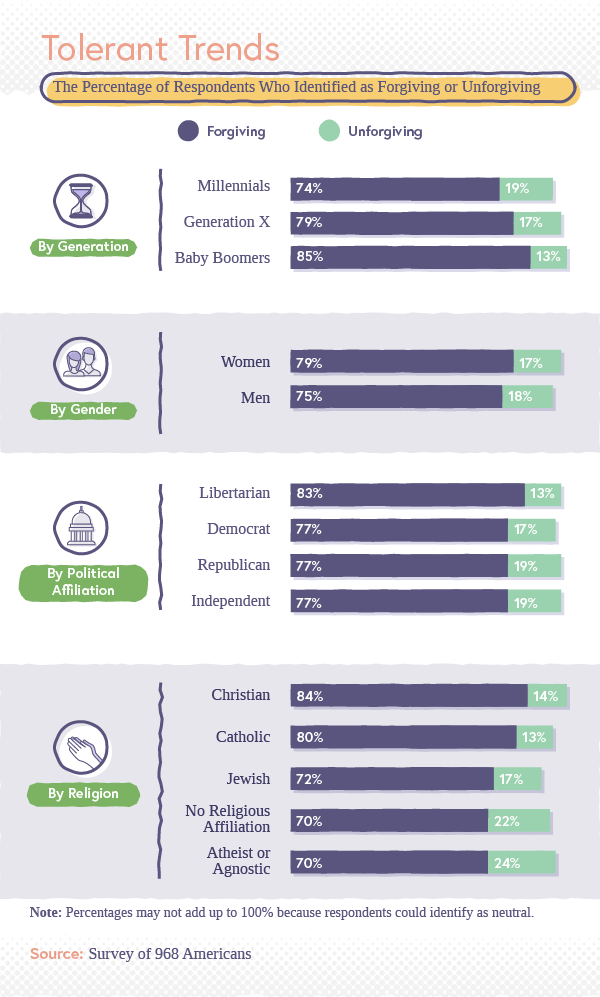
We determined that forgiveness may increase with age – with baby boomers being the most forgiving at 85 percent, Gen Xers forgiving at a rate of 79 percent, and millennials being the least forgiving at 74 percent.
Seventy-nine percent of women said they were forgiving, while 75 percent of men said the same. When analyzing political affiliation, Libertarians ranked as the most forgiving at 83 percent, followed by 77 percent of Democrats, Republicans, and Independents gambling on forgiveness.
Religion also brought some differences to the forgiveness game. Christians (which include Protestants, Methodists, Lutherans, and Baptists) ranked highest, with 84 percent also identifying as forgiving. Of respondents who identified as Jewish, 72 percent considered themselves forgiving. Interestingly, 70 percent of those with no religious affiliation and those who identified as Athiest or Agnostic identified as forgiving.
How Many Chances Is Too Many?
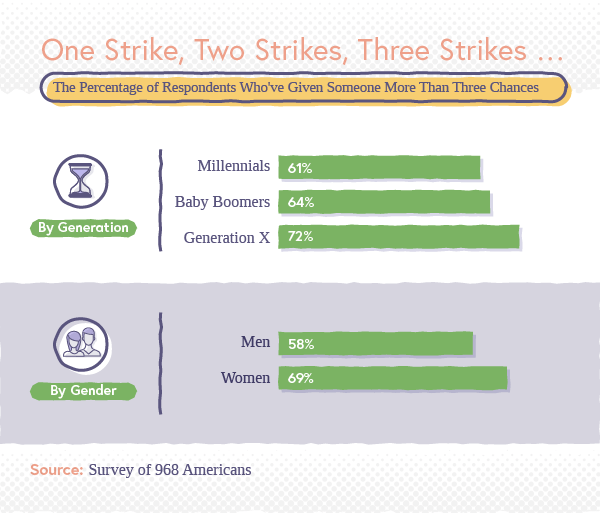
For some, forgiveness knows no bounds. For others, there is a limit to how much they can forgive before they fold and leave the game. We asked respondents if they had ever given someone more than three chances.
When broken down by gender, women were 11 percentage points more likely than men to give someone more than three chances (69 percent versus 58 percent). Somewhat conflicting was the generational trend of forgiveness: 72 percent of Gen Xers said they offered multiple chances, compared to 64 percent of baby boomers and 61 percent of millennials.
What Can Be Forgiven?
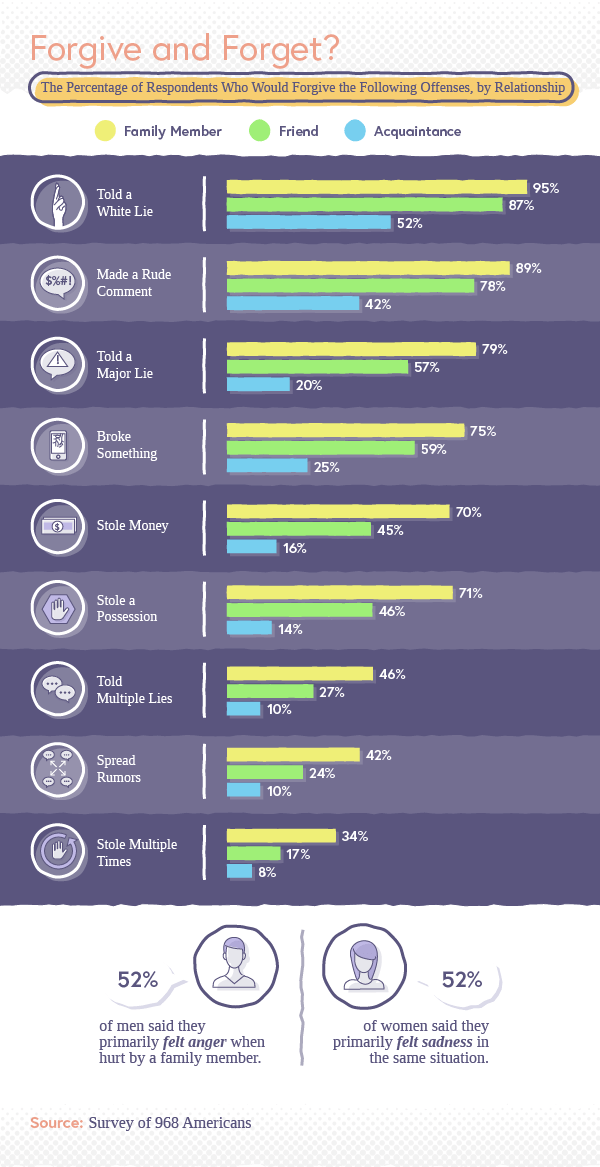
While forgiveness as a philosophy can be a noble one, sometimes granting or receiving forgiveness depends on the relationship and severity of the situation. Ninety-five percent would forgive a family member for telling a white lie, 87 percent would forgive a friend, and 52 percent would forgive an acquaintance for the same offense. There was an even greater jump when it came to having a possession stolen. Family members still got the most leniency, with 71 percent of respondents forgiving a family member, but only 46 percent offering forgiveness to a friend and 14 percent forgiving an acquaintance.
Our survey also showed a high tolerance for rude comments from family and friends (89 percent and 78 percent would brush it off, respectively), but only 42 percent would forgive an acquaintance for the same gesture. Overall, family members were the most widely acknowledged group to receive forgiveness, but even this percentage decreased as the offenses became more severe.
For example, while a white lie from a family member would be forgiven by 95 percent of those surveyed, a major lie dropped forgiveness to 79 percent, and only 46 percent forgave multiple lies. However, 52 percent of men said they primarily felt anger when hurt by a family member, while 52 percent of women said they primarily felt sadness.
What’s Love Got to Do With It?
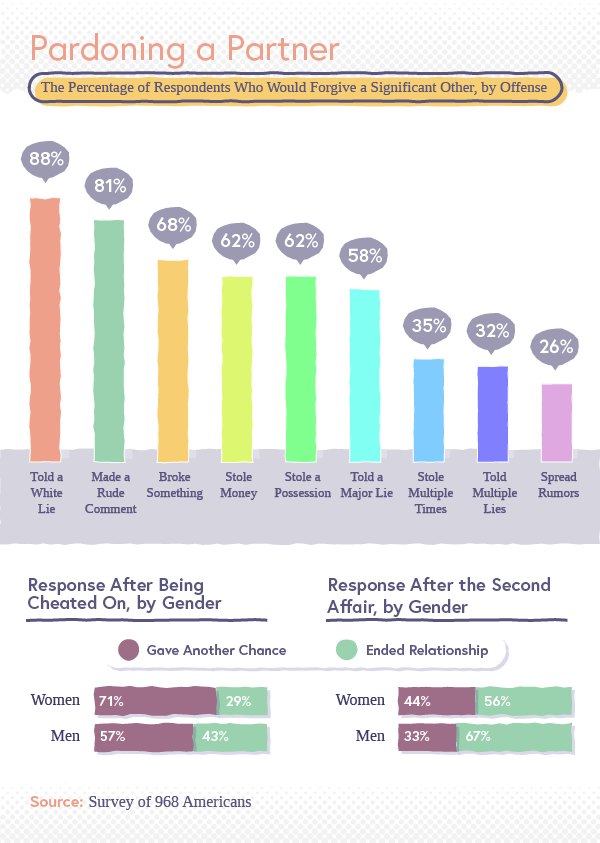
When it came to forgiving a significant other, love had plenty to do with it. Eighty-eight percent of respondents would forgive their significant other for a white lie, while 58 percent would tolerate a major lie, and 32 percent would pardon multiple lies.
When it came to infidelity, though, women were far more forgiving after being cheated on (71 percent of women versus 57 percent of men would give their partner another chance). And while these percentages dropped for both genders after a second affair, 44 percent of women would offer forgiveness yet again, compared to only 33 percent of men. And while an visible gender difference does exist when it comes to forgiving, it’s worth noting that men are at times viewed as “weak” if they forgive a cheating partner whereas women are expected to look past infidelities.
Conclusion
While being human means making mistakes, it also means forgiving and letting go. For some, giving second chances comes naturally, while for others, forgiveness can be harder to bestow depending on the severity of the mistake and the relationship to the offender. However, knowing where you stand can say a great deal about where you’re from and your life experiences and just how far you’re willing to go to forgive.
But these decisions can come both with rewards and risks. When those you love hurt you, you roll the dice with the way you respond: Will you forgive only to be hurt again, or will your relationship become stronger than before?
At LCB, risk and reward are principles we understand well. But with our guides and special offers, you don’t have to take any chances on a great betting experience – or a great deal. Whichever game suits you, we’ll help you find the best way to play.
Methodology
We surveyed 968 Americans about their forgiveness of others using Amazon’s Mechanical Turk Service. Fifty-one percent of respondents identified as women, 48 percent of respondents identified as men, and less than 1 percent identified as a gender not listed by our survey. Data shown for generation, political affiliation, and religion all had at least 20 respondents.
Fair Use Statement
Know someone who deserves a second chance? Feel free to share this page and its contents for noncommercial purposes, as long as you link back to this page and the authors. Not sure we can forgive you if you don’t.

Share on
Twitter
Facebook
Delicious
Reddit